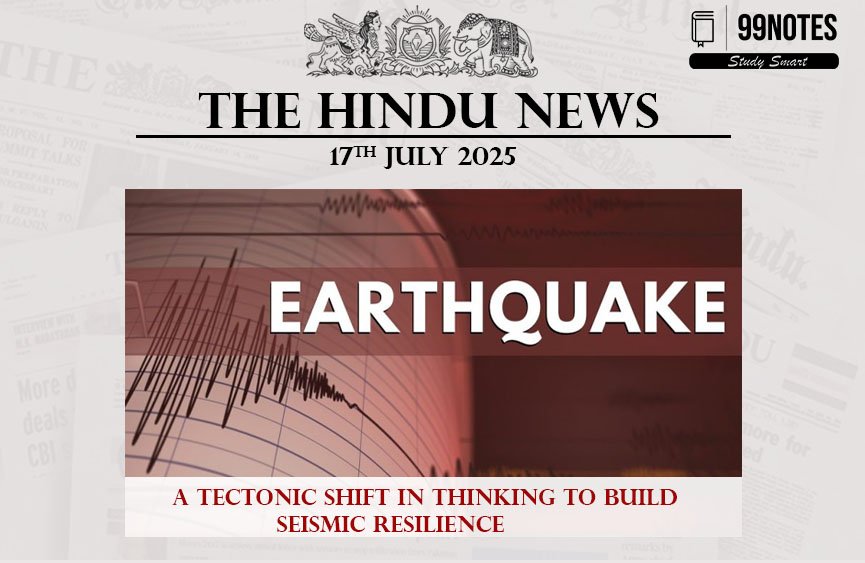19 July 2025: The Hindu Editorial
1. EU Imposes Sanctions on Refinery in Gujarat for Russia Energy Links
Source – Page 1, The Hindu Delhi Edition
| Topic: GS2 – International Relations, GS3 – Economy (Energy Security, International Trade), GS3 – Science & Technology (Sanctions Impact) |
| Context |
|
-
Key Developments
-
The EU’s latest sanctions package lowers the price cap for Russian oil and bans products refined from Russian crude.
-
The sanctions package directly names Nayara Energy’s refinery in Vadinar, Gujarat, for its Rosneft-linked ownership.
-
Full-fledged sanctions including travel bans, asset freezes, and resource restrictions will apply.
-
The EU’s action coincides with U.S. discussions on imposing heavy tariffs or secondary sanctions on purchasers of Russian oil.
Implications for India
-
The refinery supplies over 400,000 barrels per day and operates 6,300+ petrol pumps in India.
-
India’s energy security is threatened by new uncertainties in global energy geopolitics.
-
India’s Ministry of External Affairs reiterated India’s opposition to unilateral sanctions and called for non-discriminatory treatment in global energy trade.
Analysis
-
This reflects the growing complexity of global sanctions regimes and their reach into third countries’ energy assets.
-
India’s balancing act between securing affordable energy and adhering to international norms is under greater test.
-
There is increasing pressure on Indian companies with cross-border linkages to adhere to evolving compliance and due diligence requirements.
Way Forward
-
India must continue strategic diversification of energy sources and diplomatic engagement with both the West and Russia.
-
A multilateral and rules-based approach is essential to reduce risk of arbitrary restrictions impacting developing economies.
-
|
Practice Question: “In light of the recent EU sanctions on India’s Nayara refinery, discuss how global sanctions regimes affect India’s energy security and economic diplomacy. Suggest a way forward for sustaining India’s interests while addressing international expectations.” (250 words / 15 marks |
2. Falling Through the Cracks – Bridge Collapse in Gujarat Exposes Governance Failures
Source -Page 7, The Hindu Delhi Edition
| Topic: GS1 – Society, GS2 – Governance (Disaster Management, Accountability), GS3 – Infrastructure |
| Context |
|
-
Incident Overview
-
The bridge was a critical link, regularly used by both light and heavy vehicles.
-
Multiple warnings and complaints about its safety were reportedly not acted upon by the local administration and Roads & Buildings Department.
-
Recent years have seen several such infrastructure failures in Gujarat, including the Morbi collapse (2022).
Analysis
-
The tragedy highlights systemic negligence, lack of proactive maintenance, and ineffective response to citizen grievances.
-
Bureaucratic inertia and absence of preventive monitoring mechanisms contributed to loss of lives.
-
Post-incident, suspension of officials and announcement of compensation/repair plans reflect reactive, rather than preventive, governance.
Broader Implications
-
Recurrent bridge collapses question the robustness of India’s public infrastructure audit and accountability frameworks.
-
The tragedy also exposed socio-economic vulnerabilities of survivors, who face loss of livelihood and support.
Way Forward
-
Institutionalizing regular safety audits and public grievance redressal for infrastructure.
-
Strengthening local governance and transparency in repair and maintenance contracts.
-
Creating a citizen-led monitoring platform for critical infrastructure to ensure timely reporting and redressal.
-
|
Practice Question: “Discuss the governance and ethical failures revealed by repeated bridge collapses in India. What systemic changes are required for preventing such disasters and ensuring public safety?” (250 words / 15 marks |
Read more about –18 July 2025: The Hindu Editorial Analysis


